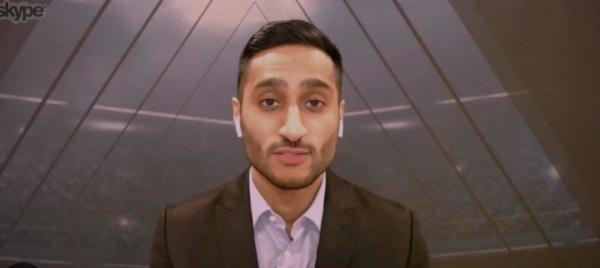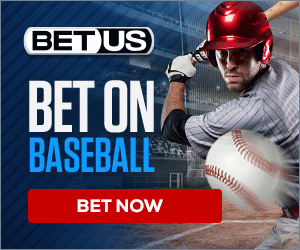Professor of Journalism: Shams Gambling Partnership a 'Credibility Killer'
Jeremy Littau is an associate professor of journalism and communication at Lehigh University and he offered his opinion on the recent controversy surrounding NBA insider Shams Charania tied to his reporting on last week's Draft.
A quick summary: Charania tweeted out that Scoot Henderson was gaining serious momentum at No. 2 with the Charlotte Hornets before last Thursday night's NBA Draft. This caused the line to move on Henderson at sportsbooks across the board.
It was later revealed that Charlotte had zero intention of selecting Henderson, information widely known among NBA insiders (Shams is hardly the only NBA insider).
While it might be easy to conclude that perhaps Charania didn't get the memo, he's a special case. Charania is employed by a sportsbook.
"The heart of this story is that Shams wasn't just reporting the rumor mill and owning the journalistic plusses and minuses of gossip-as-news," Littau states via an extensive tweet on his feed. "He also is a partner with gambling company FanDuel. What he reports has $$ implications for those reading, betting, AND taking bets.
"News reports such as injury updates, of course, have moved bets and decisions for decades. This isn't new. But independent reporting of the news is different than when the reporting is coming from someone employed by a gambling site. Huge conflict of interest, just to start."
This story about sports reporter Shams Charania doing some draft night reporting that lost people a lot of money on a gambling site he partners with .... wild. Short thread to follow: 1/ https://t.co/Qh5TJfOR1i
— Jeremy Littau (@JeremyLittau) June 27, 2023
Littau explained how his first job was at a small regional newspaper and "we had strict ethics rules considering how low the stakes are compared to being a national reporter".
He went on to explain that policies included such things as "no gifts from sources. Recuse if you have a conflict of interest. No financial conflicts".
Littau continued: "I couldn't accept a meal from a source. So if there was a lunch to do an interview, I paid if my company did not. This is standard in most newsrooms. If you're getting free stuff, you're beholden to them. You don't need to be a SCOTUS justice to see the conflict, it seems.
"It would never have occurred to me in that first job in 1998 to be simultaneously employed by another company that had a financial stake in what I report. Shams writes for legitimate news sites. The issue here is the extra paycheck, and the source of that money.
"The collab means he draws salary for promotion and hosting a show under FanDuel's branding. Maybe no real pressure, but it would be hard not to feel it. Does reporting details help or hurt his other employer, and does the prospect of an unrenewed contract shape his reporting?
"The issue here beyond the grossness of it is that it doesn't really matter whether Charania succumbs to the pressure. The possibility that he might and that we can't really know for sure whether he has, that hangs over everything he does now. It's a credibility killer.
"This by the way isn't just about what he reports. A reader could rightly wonder if he's holding back some information now, because betting odds are on the line. Again, no accusations here. It's not anything Shams is doing, it's that there's no way to be above reproach now.
"The story details a real-life anecdote that illustrates the problem. Shams reports a hot tip on draft maneuvering that turns out to be not what happened, and a college student lost a $500 bet because he thought the reporter was wired in to the latest.
"Now, the person betting is responsible for their choices, sure. But as a journalist you don't want someone to question who you're working for when they consume the news. Your obligation is to the public, to those consuming news. Not those with power.
"I am not shocked by much these days given the industry's struggles, but am genuinely surprised The Athletic allows this kind of collab given how obvious the conflicts of interests are. This story tarnishes the reporter, but it also tarnishes the news organization's brand.
"I could've accepted a free lunch and still been tough on a source as required by the work. But the appearance of conflict of interest is why you don't do it. That you have high standards doesn't matter a bit. You're using the "Hey, just trust me" defense. Not great!"
It should be noted that many US-based news outlets, not just specific reporters, now have partnerships with regulated sportsbooks like DraftKings and FanDuel.
NBC has had such a deal with PointsBet, a company that is the subject of a bidding war between DraftKings and Fanatics. PointsBet is also a company that's been hemorrhaging cash over the years.
Last November, Fox sought to pay $2.1 billion to exercise its options in FanDuel, based on the price Flutter paid in December 2020 to acquire 37% of FanDuel Group from early investors.
In 2020, Turner Sports entered into a partnership with DraftKings. Turner Sports and CNN at the time were owned by AT&T.
Late last year, DraftKings was the target of a massive hack of customer details. Few news organizations reported on the incident despite the ramifications. Thousands of DraftKings customers potentially had their accounts compromised.
ESPN, which does not have a partnership with any gambling websites, could have a conflict being in that they accept ad dollars from the likes of DraftKings and FanDuel. To their credit, they were one of the few industry news outlets to cover the DraftKings database breach.
Full disclosure, Gambling911 also takes ad dollars from gambling companies. Gambling911.com, however, has long had a policy strictly forbidding ad payment based on a percentage of player losses nor does the site engage in any type of revenue sharing dating back to 2000.
- Chris Costigan, Gambling911.com Publisher















